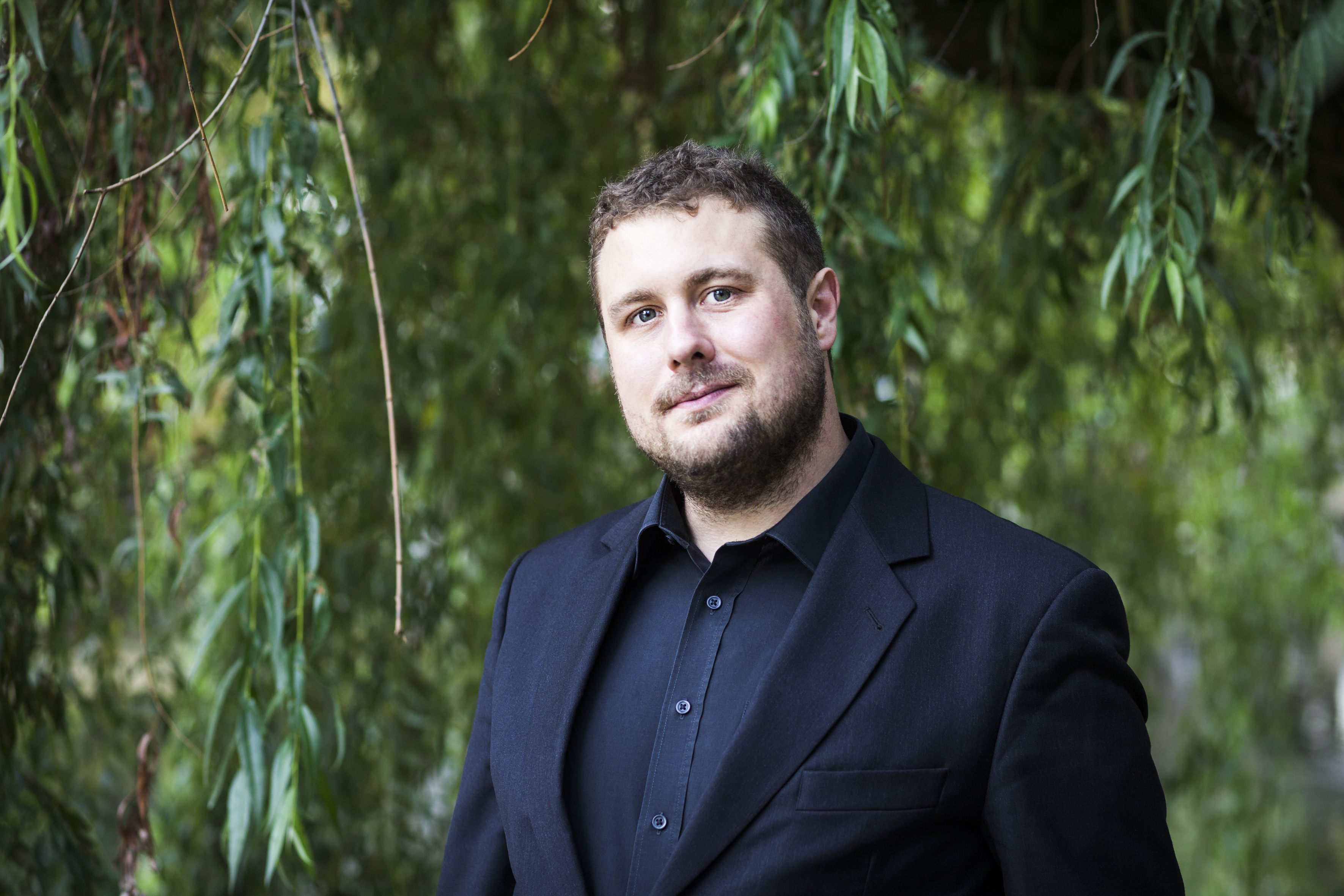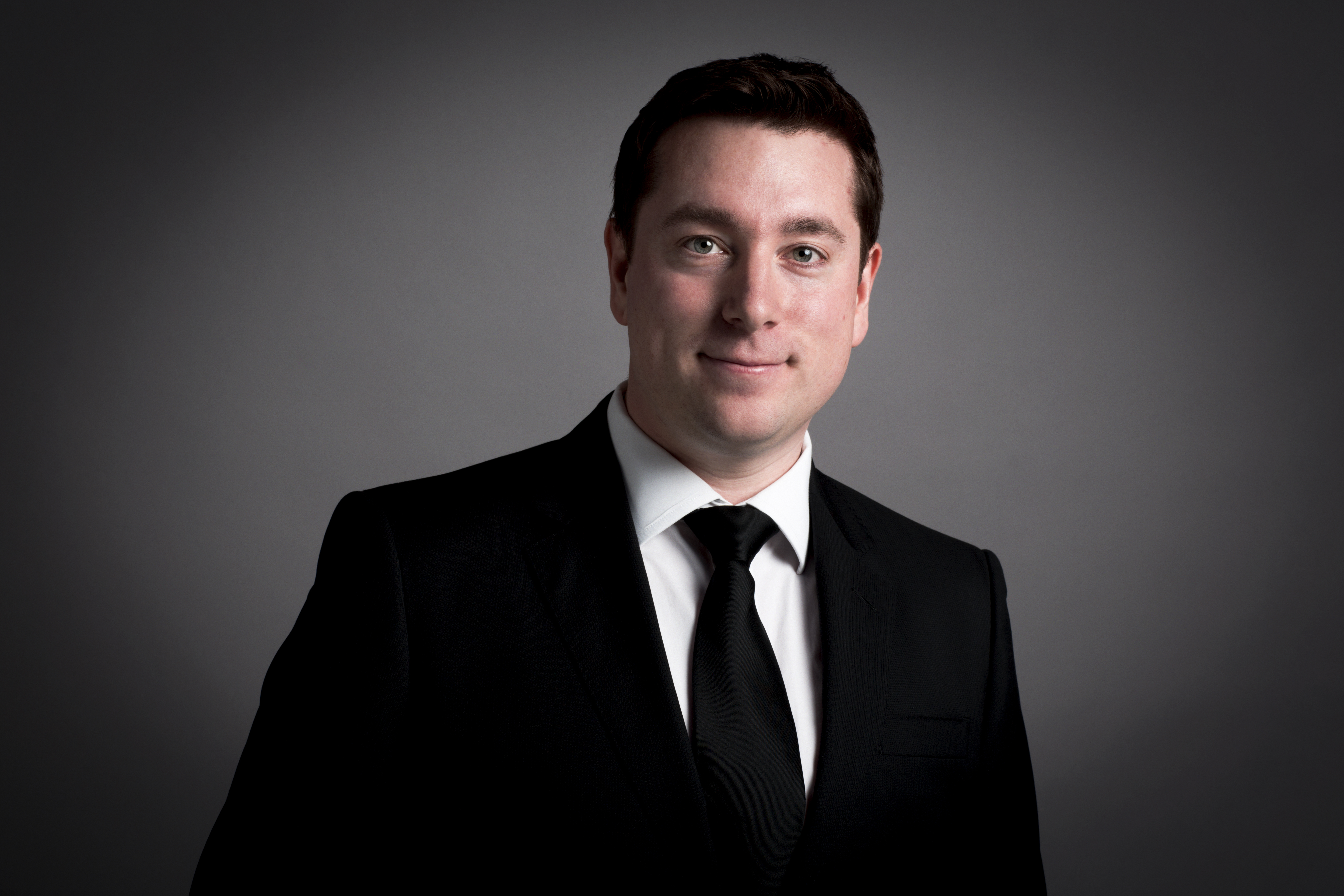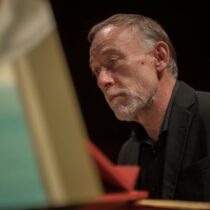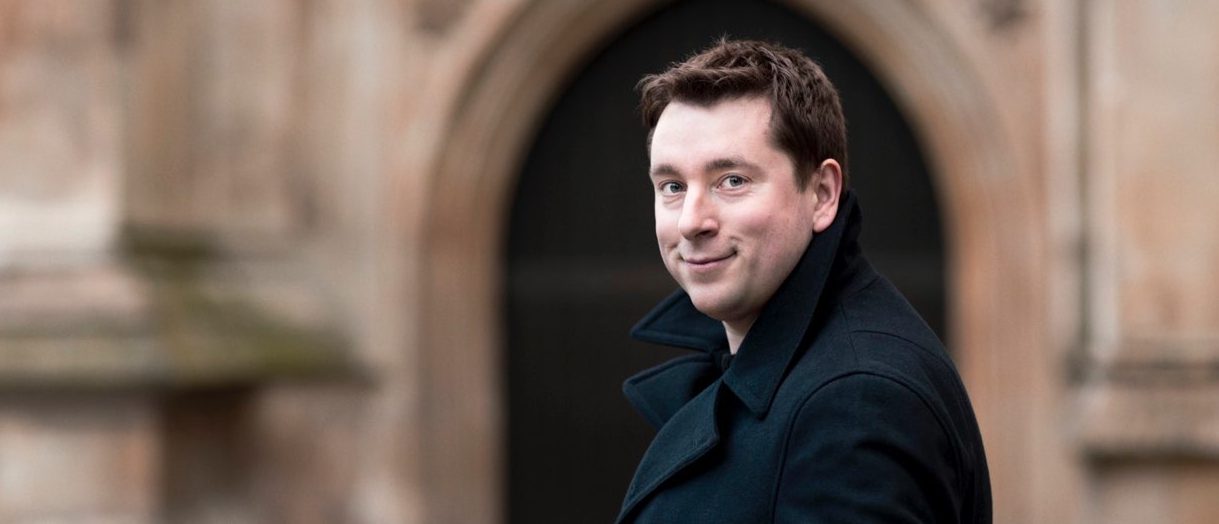Christ Church Cathedral | Map
Alex Potter, counter-tenor; Thomas Hobbs, tenor; Alexander Weimann, piano
Written in the wake of his opera Billy Budd, Canticle II (Abraham and Isaac) was composed between late 1951 and early 1952 and is a potent “miniature opera” for alto, tenor and piano created from a 15th-century Chester Miracle Play telling the story of Abraham and Isaac. Written for and dedicated to contralto Kathleen Ferrier (who created the title role in The Rape of Lucretia 1946), her part is now more commonly sung by a counter-tenor. Britten later drew on Canticle II for his War Requiem, in the setting of Wilfred Owen’s bitter retelling of the biblical story.
To download/view the programme page, notes, texts and translations, click here.
Click here for information about parking around / transiting to Christ Church Cathedral
Programme
Benjamin Britten (1913–1967)
Canticle I:
“My beloved is mine and I am his”, Op. 40
tenor & piano
“Sweeter than Roses”
(by Henry Purcell, arranged by Benjamin Britten)
countertenor & piano
“Man is for a women made”
(by Henry Purcell, arranged by Benjamin Britten)
tenor & piano
“In vain the am’rous flute”
(by Henry Purcell, arranged by Benjamin Britten)
countertenor, tenor & piano
“Night Piece”
notturno for piano solo
“The Bold Grenadier”
(traditional folk song)
countertenor, unaccompanied
“The Salley Gardens”
(traditional folk song, arranged by Benjamin Britten)
countertenor & piano
“The Foggy Foggy Dew”
(traditional folk song, arranged by Benjamin Britten)
tenor & piano
“I Dreamed a Dream the Other Night”
(traditional folk song)
countertenor, unaccompanied
Canticle II: “Abraham and Isaac”, Op. 51
countertenor, tenor & piano
Programme Notes
A British person looking at a map of Vancouver might be forgiven for expecting it to be a sort of Britannic home-away-from-home: names like Granville Island, English Bay Beach, and Nelson Street seem more like the ghosts of a vanished British-imperial past, incongruous to the contemporary reality of this beautiful, dynamic Pacific metropolis. The presence of the Victorian neo-gothic Christ Church, nestled amongst the skyscrapers, is therefore even more surprising and touching. The Cathedral has an intimate grandeur combined with the cosiness of a parish church. It is the kind of building in which Benjamin Britten would have felt perfectly at home and a most fitting venue for his music.
Britten’s dominance of the music scene in the latter half of the twentieth century might lead to the impression that his music is “typically British” but the reality is more complex and international than this. He once listed his own principal influences as Monteverdi, Purcell, Bach, Gluck, Mozart, Weber, Schubert, Mahler, Berg, Stravinsky and “even Tchaikovsky, if he is played in a restrained, though vital way”. To this one can certainly add Schönberg and his teacher Frank Bridge. By contrast, Britten showed distain for the leading British composers of the day, proclaiming himself “absolutely incapable of enjoying Elgar, for more than 2 minutes.” He also abhorred Vaughan Williams and the pastoralist school, which makes his decision to arrange folksongs all the more puzzling. Yet it would seem Britten decided to set the songs in a manner consciously opposite to that of the pastoralists, as Britten specialist Philip Brett puts it:
“Unlike Cecil Sharp and Vaughan Williams, who assigned an idealized, essential artistic quality to the melodies which their accompaniments were thought to reflect, Britten recognized that the venue changed the genre and turned them in effect into lieder or art-song, and proceeded brilliantly on that premise.“
Despite altering the nature of these traditional songs, Britten’s arrangements manage to amplify the meaning and beauty of the texts, something that he achieves to even greater effect in his original compositions. His exquisite word-setting, wonderfully displayed in Canticle I, is a direct result of his study and arranging of Purcell in the early 1940s. As he himself put it, “almost the greatest importance of Purcell for us to-day is the example of his prosody. Here surely is the way to make the English language live again in song.” Developing these ideas, Britten then championed the cause of English-language opera and founded the English Opera Group in 1947. Canticle II, written as a fundraiser for the group in 1952, is a dramatic masterpiece in miniature, expertly playing out the tension between and fears of the two protagonists. Setting the words of God for two voices and arpeggiating piano accompaniment is a stroke of genius. God becomes mystical yet familiar, powerful yet approachable, paradoxes also reflected in the character of this church; text, Britten’s music and architecture conjoin here in perfect harmony.
Alex Potter
Programme Texts and Translations
To download/view the programme page, notes, texts and translations, click here.

Alex Potter, counter-tenor
My mother always sang to me when I was a small child, which is why I began to sing. Her voice for me was intensely bound together with emotion, which will always remain with me. As a cathedral chorister, this emotional basis became intertwined with a fascination for text and symbolism in music, expanded upon and deepened during studies in Oxford and Basel. Remaining faithful to these origins over nearly twenty years in the profession, I continue to develop as a singer, musician and human, changed and enriched by the joy and sadness which life brings.
Nowadays you are most likely to hear me somewhere with Bach, although I also love to sing other music. When not performing, you will find me at home with my family, reading something geeky, wasting time on the internet, or cooking. Sharing and exchanging with other people, be it music, food, or conversation, is one of the great pleasures of life.

Thomas Hobbs, tenor
Thomas Hobbs is in demand with many leading baroque and early music ensembles, appearing throughout Europe and the US as a soloist in key works from the 16th, 17th and 18th centuries.
Current and future engagements include Haydn’s Creation with Israel Camerata in Jerusalem and with the London Philharmonic Orchestra, tours with Collegium Vocale Gent, and Bach cantatas, Mass in B Minor, and Easter Oratorio with the Nederlandse Bachvereniging. Hobbs will also sing Bach with the Musikpodium Stuttgart, and Monteverdi Vespers with the Academy of Ancient Music.
Recent concert performances include Damon in Acis and Galatea with Dunedin Consort, Bach cantatas with the Nederlandse Bachverenigning and Ensemble Pygmalion, Bach’s Christmas Oratorio with the Tonkünstler-Orchester Niederösterreich, Tonhalle Orchester Zürich and Le Concert Lorrain. Hobbs has also sung Evangelist in the Bach St Matthew Passion and St John Passion with the Choir of King’s College, Cambridge.
Hobbs’s operatic roles include a critically acclaimed Telemachus in The Return of Ulysses in a new production for English National Opera conducted by Jonathan Cohen, Apollo and Shepherd in Monteverdi’s Orfeo in semi-staged performances with Richard Egarr and the Academy of Ancient Music, the title role in Albert Herring and Ferrando in Così fan tutte. Also a keen recitalist, Hobbs’ recent highlights include performing Brett Dean’s Winter Songs at the Cheltenham Festival, Vaughan Williams’s On Wenlock Edge with the Edinburgh Quartet, Schubert’s Die Schöne Müllerin, Schumann’s Liederkreis, Op.39 and a recital of Mozart songs at London’s Kings Place.
Born in Exeter, Thomas Hobbs studied at the Royal College of Music under the tutelage of Neil Mackie, where he was awarded the RCM Peter Pears and Mason scholarships, and at the Royal Academy of Music under Ryland Davies, where he held a Kohn Bach Scholarship in addition to a full entrance scholarship. He was also a member of the prestigious Académie at the Aix-en-Provence Festival, where he performed in concert with Louis Langrée and the Camerata Salzburg.

Alexander Weimann, piano
Alexander Weimann is one of the most sought-after ensemble directors, soloists, and chamber music partners of his generation. After travelling the world with ensembles such as Tragicomedia, Cantus Cölln, the Freiburger Barockorchester, Gesualdo Consort and Tafelmusik, he now focuses on his activities as Music Director of the Pacific Baroque Orchestra in Vancouver, Music Director of the Seattle Baroque Orchestra, and regular guest conductor of ensembles including the Victoria Symphony, Symphony Nova Scotia, Arion Baroque Orchestra in Montreal and the Portland Baroque Orchestra.
Alex was born in Munich, where he studied the organ, church music, musicology (with a summa con laude thesis on Bach’s secco recitatives), theatre, mediæval Latin, and jazz piano, supported by a variety of federal scholarships. From 1990 to 1995, he taught music theory, improvisation, and Jazz at the Munich Musikhochschule. Since 1998, he has been giving master classes in harpsichord and historical performance practice at institutions such as Lunds University in Malmö, the Bremen Musikhochschule, the University of California (Berkeley), Dartmouth College (New Hampshire), McGill University, Université de Montréal, and Mount Allison (New Brunswick). He now teaches at the University of British Columbia and directs the Baroque Orchestra Mentorship Programme there. He has received several JUNO and GRAMMY Award nominations – most recently, for the album Nuit Blanches with the Pacific Baroque Orchestra and Karina Gauvin.


